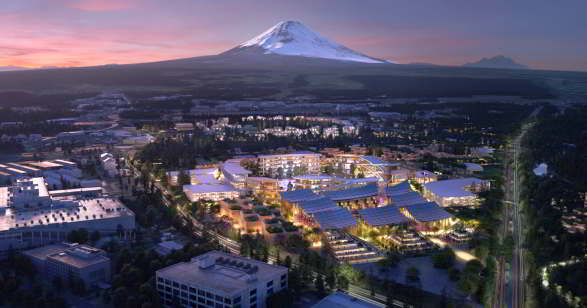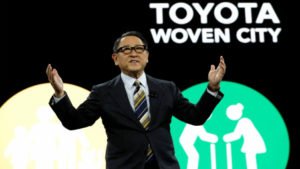
Views: 25
– Toyota has unveiled plans to build a prototype “city” of the future on a 175-acre site at the base of Mt. Fuji in Japan.
Minapim by Hernan Valenzuela: Called Woven City, it will be a fully connected ecosystem powered by hydrogen fuel cells. Conceived as a “living laboratory,” Woven City will serve as a home for residents and full-time researchers who can test and develop technologies such as autonomy, robotics, personal mobility, smart homes, and artificial intelligence in a real way. world environment.
Woven City is a fully connected hydrogen fuel cell powered ecosystem to be built at the base of Mt. Fuji in Japan.
This “living lab” will include 2000 full-time residents, adding more as the project progresses. Researchers will test and develop technologies such as autonomy, robotics, personal mobility and smart homes in a real-world environment.
Woven city
A LIVING LAB FOR

Bringing together community, personal mobility, mobility as a service, robotics, smart home, AI connectivity, multigenerational assistance, optimizing nature and promoting health, hydrogen-powered infrastructure, academic research and incubation, industry collaboration, smart building and manufacturing,
“Building a complete city from the start, even on a small scale, is a unique opportunity to develop future technologies, including a digital operating system for the city’s infrastructure. With people, buildings and vehicles all connected and communicating. of data and sensors, we can test connected AI technology … in both the virtual and physical worlds … maximizing its potential, “said Akio Toyoda, president of Toyota Motor Corporation.
Toyota will openly invite you to collaborate with other business and academic partners and invite interested scientists and researchers from around the world to work on their own projects in this unique real-world incubator.
“We welcome all those inspired to improve the way we live in the future, to take advantage of this unique research ecosystem and to join us in our quest to create an ever better living and mobility for everyone,” said Akio. Toyoda, president, Toyota Motor Corporation.
For the Woven City project, Toyota hired Danish architect Bjarke Ingels, CEO of the Bjarke Ingels Group (BIG). His team at BIG has created many outstanding projects: from 2 World Trade Center in New York and Lego House in Denmark, to Google’s headquarters in Mountain View and London.
“A swarm of different technologies is starting to radically change the way we live and navigate our cities. Connected, autonomous, emission-free and shared mobility solutions are bound to create a world of opportunity for new urban life. With the breadth of technologies and industries with which we have been able to access and collaborate with Toyota’s corporate ecosystem, we believe we have a unique opportunity to explore new forms of urbanity with Woven City that could open new avenues for other cities to explore, ”said Bjarke Ingels, Founder and Creative Director, BIG.
City design
The city’s master plan includes street use designations in three types: for faster vehicles only, for a mix of lower speed, personal and pedestrian mobility, and for a walk similar to a pedestrian-only park. These three types of streets intertwine to form an organic grid pattern to help speed up the autonomy tests.
The city is planned to be fully sustainable, with buildings made primarily of wood to minimize carbon footprint, using traditional Japanese joinery combined with robotic production methods. The roofs will be covered by photovoltaic panels to generate solar energy in addition to the energy generated by hydrogen fuel cells. Toyota plans to weave outdoors throughout the city with native vegetation and hydroponics.
The homes will be equipped with the latest human support technologies, such as home robotics, to help with daily life. Residencies will use sensor-based AI to check occupant health, address basic needs, and improve daily life, creating an opportunity to safely and positively connect integrity and trustworthy connected technology.
To move residents around the city, only fully autonomous and zero emission vehicles will be allowed on the main roads. Throughout Woven, autonomous Toyota e-Palettes will be used for shipping and delivery as well as for mobile changeable retail.
The neighborhood parks and a large central park for leisure, as well as a central square for social gatherings, are designed to bring the community together. Toyota believes that encouraging human connection will be an equally important aspect of this experience.
Toyota plans to fill Woven City with Toyota Motor Corporation employees and their families, retired couples, retailers, visiting scientists and industry partners. Site innovation is expected in early 2021.
Partner Call
Woven City aims to develop a wide range of solutions in building the world’s first programmable city. We are very open to building relationships and working with business partners who share the same vision. If you wish to cooperate, please contact us. We look forward to hearing from many potential contributors.
Interested in partnering with Toyota in the development of woven City? Visit: woven-city.global
Source: Toyota
Related article: Toyota and Denso to launch MIRISE semiconductor venture for future technology
Did you like the article? Subscribe to the newsletter!